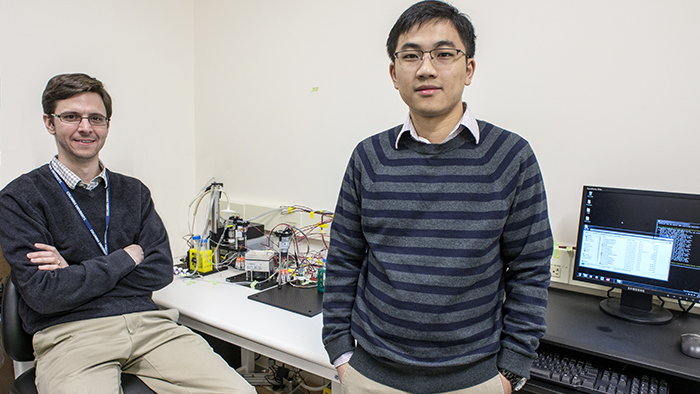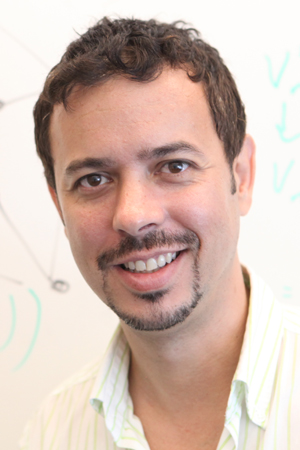News
Systems Biology Faculty Nab Chan Zuckerberg Initiative Grants to Advance Human Cell Atlas

Assistant Professor Peter Sims and postdoctoral research scientist Jinzhou Yuan displaying their platform for automated single-cell RNA sequencing. (Photo: Lynn Saville)
Assistant Professor Peter Sims, PhD , has been awarded an inaugural Chan Zuckerberg Initiative (CZI) award for gene sequencing research that will help advance the Human Cell Atlas project. Launched in 2016 by a cohort of world-leading scientists, the Human Cell Atlas is a high-profile endeavor whose goal is to identify and define every cell type of the human body and create a collection of maps that will describe the cellular basis of health and disease.
With the support of CZI, founded by Facebook CEO Mark Zuckerberg and his wife, Priscilla Chan, Dr. Sims and his group in the Department of Systems Biology will receive grant funding to pilot a revolutionary technique for high throughput single-cell sequencing. Called SCOPE-Seq, the novel, economical method conducts RNA sequencing coupled with live imaging of the same individual cell on a large scale.
“We hope that our approach will provide functional insights into the novel cell types that will be discovered by the Human Cell Atlas effort that cannot be obtained from genomic analysis alone,” said Dr. Sims.

Raul Rabadan
Fellow Systems Biology Professor Raul Rabadan, PhD , who directs the Center for Topology of Cancer Evolution and Heterogeneity, also is gaining support from CZI in a collaboration led by Tom Maniatis, PhD, who won the grant for their research to construct an atlas of gene activity of all cells in the human spinal cord. Dr. Maniatis chairs the Department of Biochemistry and Molecular Biophysics, directs Columbia's Precision Medicine Initiative and is a principal investigator at Columbia's Mortimer B. Zuckerman Mind Brain Behavior Institute.
In total, CZI intends to fund 38 pilot projects from a pool of nearly 500 proposals. Selected scientists and engineers represent eight different countries across four continents. A true global collaboration, notes CZI Science President Cori Bargmann, "The Human Cell Atals will bring us closer to the goal of curing, preventing or managing all diseases by the end of the century."
With post-doctoral scientist Jinzhou Yuan, Dr. Sims devised SCOPE-Seq to sequence the cells’ complete set of transcripts and obtain live imaging data for each individual cell. In future work, this new, more comprehensive technique could be applied to study the molecular mechanism of drug resistance or to associate dynamic protein expression patterns with genome-wide mRNA expression profile of individual cells.
Dr. Sims, who joined Columbia in 2012, has been developing a number of innovative technologies for studying single cells in a high-throughput setting. The Sims Lab focuses on improving single-cell approaches to systems biology, key in examining and determining how individual cells respond to identical chemical and genetic perturbations. Dr. Sims and his group develop new, cutting-edge tools for complex single-cell analysis using techniques like next-generation sequencing, advanced microscopy and microfabrication.
Dr. Sims is also affiliated with the Department of Biochemistry and Molecular Biophysics and is currently the associate director for novel technology at the JP Sulzberger Columbia Genome Center. On SCOPE-Seq, the Sims Lab is collaborating with multiple researchers across University departments, including neurological surgery, pathology, medicine and surgery, microbiology & immunology.
-Melanie A. Farmer